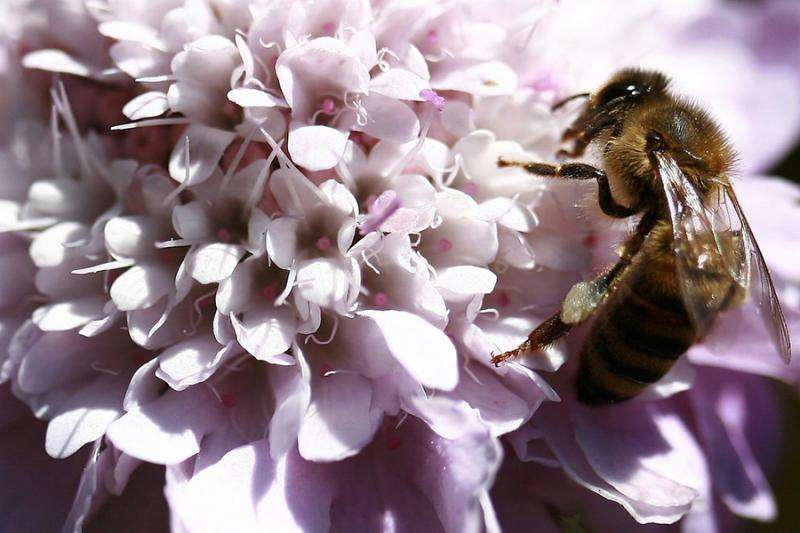Are plants the puppet masters in the pollination game?

While pollination is a subject that most of us don't give much consideration, behind the scenes it plays a significant role in the production of the food we consume each day.
The importance of the process of pollination is certainly not lost on Professor Graham Pyke, researcher and Distinguished Professor from the UTS School of Life Sciences, who has shown a keen interest in this area of research for more than four decades.
"About one third of what we humans eat depends directly or indirectly on pollination," Professor Pyke said.
"There are in particular a number of crops that require pollination in order for the flowers to form seeds and fruit."
In Professor Pyke's most recent paper, published in the journal Trends in Ecology and Evolution, he suggests future research in the area of nectar pollination needs to shift its focus from the long-held view that nectar acts as an attractant for pollinators.
"It's virtually impossible for plants to act as an attractant, either attracting initial visits or attracting repeat visits," Professor Pyke said. "The basic issues are that pollinators cannot assess nectar on offer at flowers until they get there, they would generally struggle to remember individual plants on the basis of nectar reward, and even if they could it would be inefficient for them to bypass other plants.
"But what the plants can do, and this happens all the time, is manipulate the behaviour of a pollinator while it is on a plant," he said. "It is common, for example, for flowers on the same plant to have similar nectar, and so a pollinator typically decides whether to probe further flowers on its current plant, based on what it has just obtained from a flower.
"This means that a plant can manipulate its pollinators in terms of how many flowers they probe per visit, and hence pollen transfer and plant reproduction, through the nectar it provides."
Professor Pyke suggests this shift to viewing pollen as a manipulator, rather than an attractant, will help researchers better understand outcomes of what he refers to as an "evolutionary game" involving plants and their pollinators.
One example is a positive correlation between pollinator body size and nectar production per flower per day. Professor Pyke said it might be tempting to explain this on the simple basis that larger animals need more energy.
"But evolution does not work this way, with one species evolving to benefit another. Even harder to explain are negative correlations between pollinator body size and nectar sugar concentration."
Professor Pyke said such patterns have perplexed pollination ecologists for a long time and that his approach should unravel these mysteries.
"It's an evolutionary game in the sense that it involves individual plants and individual pollinators, and what one individual in the game achieves out of the game depends on what the other individual does," he said.
He has pointed out this in another recent paper Plant-pollinator co-evolution: It's time to reconnect with Optimal Foraging Theory and Evolutionarily Stable Strategies in the journal Perspectives in Plant Ecology, Evolution and Systematics.
Shifting the focus in nectar pollination research is also likely to have important practical implications for future crop production. Crop plants, such as the Australian macadamia, that involve pollination by nectar-feeding animals, and where the outputs are the seeds we love to eat, are perfect candidates for research that mirrors the research so far carried out by Professor Pyke.
"If we look at nectar production, and the behaviour of the pollinators, and if you understand what's going on there you may be able to adjust the system through breeding programs and so on to get a better result," Professor Pyke said.
The next step for Professor Pyke is to test his hypothesis through observing the foraging behaviour of honeyeaters (Australian nectar-feeding bird species), and correlating this with nectar production in plants to create a framework for future research.
His hope is that his most recent papers will shine a new light on the pollination process and help guide his fellow researchers.
"I'm basically saying to my pollination ecologist colleagues 'if you want to understand these patterns here's how you need to approach the problem, here's the mindset you need to have'," Professor Pyke said.
More information: Graham H. Pyke. Plant–pollinator co-evolution: It's time to reconnect with Optimal Foraging Theory and Evolutionarily Stable Strategies, Perspectives in Plant Ecology, Evolution and Systematics (2016). DOI: 10.1016/j.ppees.2016.02.004
Graham H. Pyke. Floral Nectar: Pollinator Attraction or Manipulation?, Trends in Ecology & Evolution (2016). DOI: 10.1016/j.tree.2016.02.013
Journal information: Trends in Ecology and Evolution
Provided by University of Technology, Sydney



















